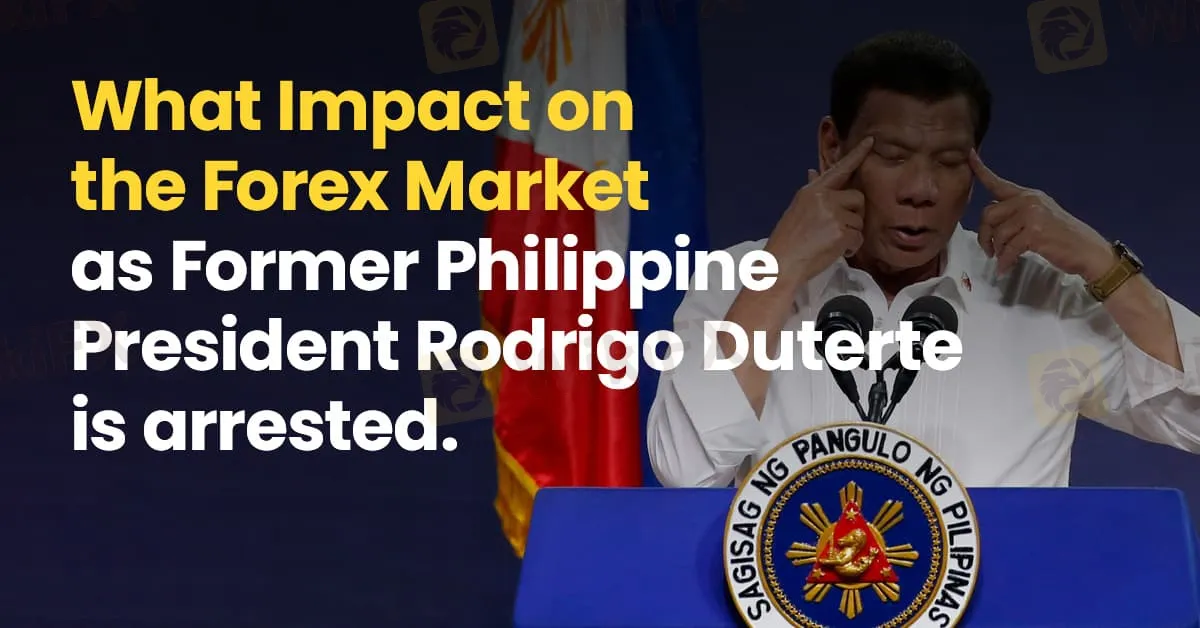What Impact on the Forex Market as Former Philippine President Rodrigo Duterte is Arrested.
Abstract:The sudden arrest of former Philippine President Rodrigo Duterte on an International Criminal Court (ICC) warrant has sent shockwaves through global markets and regional investors alike. While Duterte’s arrest is being hailed by human rights groups as a decisive step toward accountability for his controversial “war on drugs,” it also raises significant questions about factors that can strongly influence the forex market.

The sudden arrest of former Philippine President Rodrigo Duterte on an International Criminal Court (ICC) warrant has sent shockwaves through global markets and regional investors alike. While Dutertes arrest is being hailed by human rights groups as a decisive step toward accountability for his controversial “war on drugs,” it also raises significant questions about factors that can strongly influence the forex market.
Immediate Market Volatility
Following Dutertes detention upon his return from Hong Kong on March 11, 2025, traders have been closely monitoring the Philippine peso. In the immediate aftermath, the uncertainty surrounding the political fallout has led to heightened volatility in the forex market. According to report, the US dollar to Philippine peso exchange rate currently hovers around 1 USD = 57.38 PHP, a level that may quickly adjust if investors begin to factor in heightened risk premiums and potential capital outflows.
Investor Sentiment
Dutertes arrest, tied to allegations of crimes against humanity during his aggressive anti-drug campaign, has sparked fierce debate both domestically and internationally. On one hand, critics argue that the arrest could erode investor confidence by introducing further political uncertainty and raising fears of internal instability. Such uncertainty might prompt short-term selling pressure on the peso.
On the other hand, some analysts view the move as a necessary rebalancing toward accountability and the rule of law—elements that could, over time, restore confidence in the Philippines‘ governance and its economic fundamentals. Reuters reported that while Duterte’s arrest has polarized public opinion, the current administration insists that the action was “proper and correct,” emphasizing that the Philippines is fulfilling its international obligations through Interpol. If market participants interpret the arrest as a sign of the governments willingness to enforce the law, it may mitigate fears of long-term instability.
Potential Long-Term Forex Implications
The immediate reaction in the forex market may be characterized by increased volatility and risk-aversion, which often translates into depreciation pressure on emerging market currencies like the Philippine peso. However, should the arrest lead to enhanced transparency and a stronger commitment to good governance, the long-term outlook for the peso might improve. Investors tend to reward countries that take credible steps toward resolving political uncertainties—even if the short-term impact is negative.
Moreover, central banks and policymakers in the Philippines could respond by tightening or adjusting monetary policy to stabilize the currency, particularly if capital outflows begin to mount. This balancing act between addressing immediate market fears and building longer-term confidence will be crucial to determining whether the peso will suffer further declines or begin to recover.
Conclusion
The arrest of Rodrigo Duterte has introduced a new layer of uncertainty into the forex market, with immediate volatility likely reflecting investors concerns about political instability and its economic repercussions. In the short term, the Philippine peso may face depreciation pressures as risk-averse traders seek safer assets. However, if the arrest is ultimately seen as a step toward greater accountability and a reinvigorated commitment to the rule of law, it could pave the way for improved investor confidence and a more stable forex outlook over time.
As the situation develops, market participants will continue to weigh the costs of political uncertainty against the potential benefits of a more transparent and accountable governance framework. The outcome of this high-profile case—and the government‘s response—will be a key indicator of the peso’s trajectory in both the near and long term.

Read more

TradingPRO: A Closer Look at Its Licences
In an industry where safety and transparency are essential, the regulatory status of online brokers has never been more important. For traders seeking to protect their capital, ensuring that a platform operates under recognised and stringent oversight can make all the difference. Keep reading to learn more about TradingPRO and its licenses.

New SEBI Regulations on Intraday Trading
The Securities and Exchange Board of India (SEBI) has implemented revised regulations on Intraday trading, with effect from November 20, 2024. These regulations are meant to lessen risks and prevent speculative trading practices.

A Guide to Intraday Forex Trading You Can't Miss Out
Intraday trading where everything happens in a day fascinates millions around India and worldwide. The drama, the hype, and the ups and downs resulting from those are nothing short of an adventure. Read this guide to ace the forex intraday trading game.

Top Forex Trading Strategies Every Trader Must Implement
Successfully navigating the fluctuating forex market landscape requires more than having a high-risk appetite. It requires effective strategies that assure you gains even during the market fall. Let’s go through the strategies many traders implement to gain.
WikiFX Broker
Latest News
ASIC Urges Financial Licensees to Fix Register Errors Before 2026 Deadline
eToro Review 2025: Top Trading Opportunities or Hidden Risks?
How much money will you earn by investing in Vantage Broker?
IronFX vs Exness Review 2025: Comprehensive Broker Comparison
Fraudsters Are Targeting Interactive Brokers' Users with Lookalike Emails
Everything you need to know about ADSS
SkyLine Guide 2025 Malaysia: 100 Esteemed Judges Successfully Assembled
Vantage Markets Review 2025: Trusted Forex and CFD Trading Since 2009
Top Tips to Choose the Best Forex Broker in 2025
SEBI Notifies New F&O Rules for Investors - New Derivative Trading Limits & More Amendments
Rate Calc
